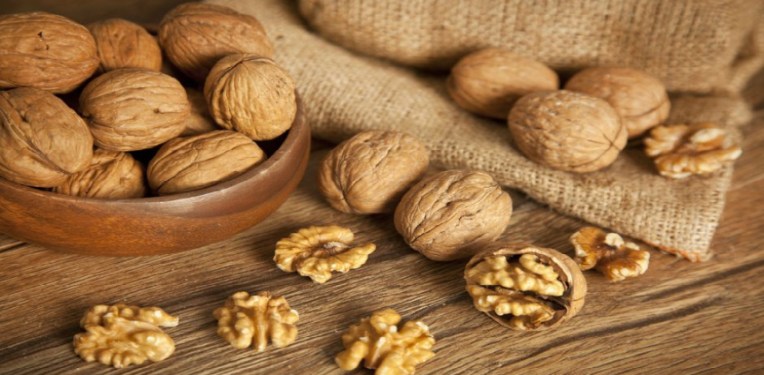Science tells us that walnuts, like other tree nuts, offer a variety of health benefits, especially when consumed on a regular basis (1, 2, 3, 4, 5).
However, there is a claim that says: walnuts may trigger heartburn in some individuals!
Is it really possible that walnuts – which offer many benefits to your health – can also give you heartburn?
The Immediate Answer
The short answer is yes. Walnuts may give you heartburn, especially if you eat too many of them at one go.
But, it is important to indicate that if you are a healthy person who normally doesn’t experience acid reflux, then you should have nothing to worry about. This is because eating walnuts won’t cause you to develop acid reflux disease!
In light of this, we can say walnuts can induce heartburn in those who are prone to it.
Does this mean everyone with acid reflux is bound to experience heartburn after eating walnuts?
The answer is no. Even if you are prone to acid reflux, that doesn’t necessarily mean that walnuts will give you heartburn. Because, when it comes to acid reflux disease, everyone has different food triggers.
“The foods that trigger heartburn are different for everyone,“ said Dr Kyle Staller, a gastroenterologist at Harvard-affiliated Massachusetts General Hospital (6).
What is Acid Reflux?
Acid reflux occurs when the Lower Esophageal Sphincter muscle, aka LES, ( located at the bottom of the food pipe ) relaxes at the wrong time (7, 8).
LES allows foods to enter the stomach and prevents stomach content/acid from travelling back up to the oesophagus by remaining closed.
However, sometimes, LES doesn’t close as tightly as it should after allowing foods entering the stomach.
As a result of that, stomach acid leaks up into the oesophagus, causing some symptoms.
Hiccups, cough, hoarse voice and heartburn (burning sensation in the chest) are the common symptoms of acid reflux (8).
Because heartburn is the most common symptom of acid reflux, acid reflux and heartburn are often used interchangeably (9, 10)
If you experience heartburn on a regular basis, that means your LES muscle often doesn’t close properly when it should.
There are various factors that could prevent LES muscle from closing properly and foods are one of them (11).
Many foods and drinks are known to either relax LES muscle or increase stomach acid, thereby, enhancing the risk of acid leakage.
Walnuts are one of these foods that may cause heartburn in those who are prone to it.
Walnuts and Acid Reflux
It shouldn’t be too hard for you to predict the positive outcomes of regular consumption of walnuts if you just know some of the essential nutrients that exist in walnuts.
Protein, healthy fats, dietary fibre, manganese, copper and antioxidants are some of them (12, 13).
In addition to their health benefits, the taste of walnuts should be mouth-pleasing for most people, otherwise, they probably wouldn’t be one of the most consumed nuts around the world (14, 15).
When taking all of these factors into account, the fact that walnuts are a potential heartburn trigger can surprise you.
You may want to ask how can walnuts – which are associated with many health benefits – also cause heartburn.
Healthy Foods and Acid Reflux
When it comes to acid reflux disease, there are many surprising foods that can cause heartburn, for instance, tomatoes!
Although tomatoes are overall healthy and consumed throughout the world, tomatoes can give you heartburn.
Garlic, onions, oranges, grapefruit, avocados and pineapple are other healthy foods associated with acid reflux (16, 17).
So, walnuts are not the only healthy foods that may induce heartburn!
Why Do Walnuts Trigger Heartburn?
Actually, there are a couple of reasons. However, the first and main reason that walnuts are linked to heartburn is their high-fat content.
According to the U.S. Department of Agriculture; walnuts contain about 65% fat by weight (18, 19)
This raises another important question! How do healthy fats that exist in walnuts show the same effect as unhealthy fats and trigger acid reflux?
Indeed, the fat content of walnuts is rather healthy and beneficial, especially for your cardiovascular health.
But, when it comes to acid reflux, fat is fat whether healthy or not.
Nonetheless, the fat found in greasy foods such as french fries, and potato chips can be expected to show a stronger effect compared to healthy fats found in such as avocados and walnuts (20).
C. Prakash Gyawali, a gastroenterology professor at Washington University says: “Fat is one of the triggers to make the bottom sphincter in the oesophagus relax and promote a tendency towards reflux,” according to Livestrong (21).
Walnuts are not the only nuts that can trigger acid reflux though. Tree nuts with high-fat content may lead to heartburn.
The thing is the fat content of walnuts is higher than most other nuts! So, walnuts are more likely to cause heartburn!
Three Reasons Walnuts May Cause Heartburn
As indicated above. The high-fat content of walnuts is not the only reason that walnuts are associated with heartburn. There are other factors as well.
In this section, we will be looking at all the factors that make walnuts a potential heartburn trigger.
Walnuts Are Fatty
As mentioned above, the main reason that walnuts are linked to heartburn is the high-fat content of walnuts.
To be more precise; 100 gr walnuts contain around 65 gr total fat (18, 19)
As we discussed above, we know that fat ( whether healthy or not ) can increase the risk of having heartburn.
But, it bears the question, why? In what way fatty foods can induce heartburn?
The answer is simple! Fatty foods (fat) remain in the stomach longer than any other food (22, 23)
The longer the foods remain in your stomach, the more acid your stomach produces to break them down. That, in turn, increases the risk of stomach acid escaping toward your food pipe (24, 25)
When you eat walnuts your stomach is bound to produce a relatively high amount of acid to break down the fat in walnuts. And, that excess acid can trigger acid reflux.
Of course, how much acid your stomach will produce when you consume walnuts mostly depends on how much walnuts (that means how much fat) you consume.
Walnuts Are Slightly Acidic
Hearing that walnuts are acidic can be quite surprising.
After all, when acidic foods are mentioned, most of us tend to visualise for instance; lemon, grapefruit, plums, soda, etc.
Although they are not as acidic as lemon is, walnuts, too, are considered acidic.
And, multiple scientific studies and many medical experts tell us that acidic foods can make acid reflux worse (26, 27, 28)
How acidic can walnuts be?
In fact, walnuts are not too acidic but are still considered acidic because their pH levels are less than 7, more precisely around 5,4.
Note that the pH scale ranges from 0 to 14. While zero is the most acidic, fourteen is the most basic and 7 is neutral.
The acid that exists in walnuts shouldn’t pose any risk of heartburn to a healthy person!
However, if you are susceptible to acid reflux, walnut acid can increase the acid levels in your stomach, thus, increasing the heartburn risk.
Walnuts May Relax the Lower Esophageal Sphincter
Above, we defined the Lower Esophageal Sphincter, aka LES.
Simply, LES is a barrier between the stomach and food pipe, which opens when you eat and remains closed when you don’t.
What studies and medical experts tell us is that high-fat foods (in our case walnuts) may relax the Lower Esophageal Sphincter, hence, bringing about acid reflux symptoms (29, 30, 31)
It bears repeating; if LES relaxes at the wrong time, stomach acid could escape upward toward the food pipe, therefore, cause a burning sensation in the middle of the chest.
Please note that there are other factors known to relax the LES muscle.
Stress and certain diseases, for instance, hiatal hernia, can be given as examples (32, 33).
Should You Give Up Walnut As They Give You Heartburn?
Although walnuts have a plethora of benefits to offer to your body, these tasty nuts may trigger heartburn. And, we have provided 3 plausible reasons for it, which are:
- Walnuts are fatty
- Walnut are acidic
- Walnuts may relax the Esophageal Sphincter
You might be one of the acid reflux sufferers who usually experience heartburn after consuming walnuts.
If so, the question is; Should you stop eating walnuts as they give you heartburn?
First of all, you should make sure that walnut is the culprit.
In general, it is not too easy to find out which food is the one that gives you heartburn, because we consume various different foods during the day
If you almost always experience heartburn after eating walnuts. Then, walnuts are more likely the main culprit.
Even if so, eliminating walnuts from your diet wouldn’t be a very sensible decision. This is, primarily, because walnuts can improve both your cognitive and cardiovascular health.
And, the second reason that giving up eating walnuts is not a good idea is that there might be ways to consume walnuts without getting heartburn.
Ways to Consume Walnuts Without Getting Heartburn
Here are some tips to consume walnuts without getting heartburn.
- You can lower the number of walnuts you eat in one go. This will decrease the amount of fat as well as acid that enters your stomach, so the risk of having heartburn becomes lesser in return.
- You can take a walk after eating walnuts and decrease your heartburn risk. This is because walking after eating is good for acid reflux as it improves digestion.
- Try not to lie down right after whatever you eat. Standing or sitting can help you avoid heartburn as gravity can keep the stomach content where it belongs.
- If you often experience heartburn after eating fatty walnuts, consider replacing them with almonds. Almonds, in small amounts, are less likely to trigger heartburn because they contain a smaller amount of fat than walnuts.
Conclusion
When it comes to acid reflux, even very healthy foods can trigger heartburn. And, walnuts are a good example of this situation.
They are loaded with various essential nutrients, but, they can still cause acid reflux owing to their high-fat amount.
Acid reflux has become a common disease around the world, affecting many individuals. If you, too, suffer from acid reflux there are ways to restrain it.
On this website, we published an article titled ” The best ways to prevent acid reflux.” It can help you better deal with acid reflux.
NOTE: If you experience acid reflux more than 2 days a week, for several months, you probably have GERD, which is chronic acid reflux disease. In this case, we strongly recommend you work with your doctor.
Tarkan is an experienced health writer ( currently more than 600 articles ) and also the founder of this website namely www.neededforhealth.com. His expertise in health stems from in-depth medical research and knowledge which he obtained over the course of many years.
Tarkan enjoys sharing factual knowledge on health, psychology and nutrition. He always aims to deliver evidence-based recommendations, provide links to related scientific studies.

